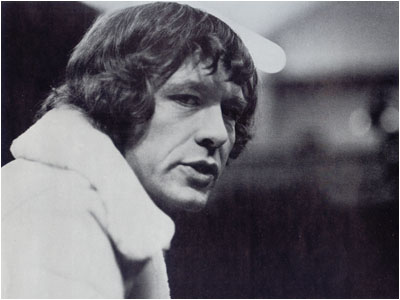Wilhelm Liefland
On the death of our staff member

Foto: Dagmar Gebers (1979)
We mourn for Wilhelm Liefland, the poet, writer, musician and Jazz critic, our staff member and friend.
By accident, Wilhelm Liefland fell a victim to a youth running amok, who assaulted him and beat him up in the Frankfurt city centre last Saturday night. For a few days in his apartment, alone and together with friends, he had tried to overcome shock, fear and physical pain. Then, his sudden decision to make a trip alone to the North of Germany and to the sea. He was familiar with the shallows at Nordstrand, the landscape of his childhood and youth. It was home he wanted to and did see facing his death.
Wilhelm Liefland, born in 1938, was son of an orthodox Protestant minister. The power of his intelligence and feelings led him far away from his origin and upbringing, yet not far enough so he would not suffer from is being someone separate, someone different. He, who had been stigmatized at such an early age, would have needed nothing more badly than security. The fight for recognition for him was a day–to–day fight for persona survival. He worked hard – but he always worked with pleasure. His artistic and literary achievements and those of his work as a critic, as subjectively and at times hermetically they appeared, they always had their addressees. Increasingly, Liefland’s work gained appreciation, recognition, and admiration. All of that, however, could only party help the injured, permanently sensitive person. Only a kind of love and warmth much more encompassing could have kept him alive. We also, his colleagues and friends must ask ourselves whether what we gave him really was enough.
Wilhelm Liefland died of coldness in human relationships and social institutions. To him who was living without protection armour, almost any difficulty in his profession, any private conflict became a sombre omen threatening his existence. So he felt the assault to be at last a kind of death sentence.
As a poet and writer, Wilhelm Liefland advanced in mastering his fear. His busy life transcended to take on literary-artistic shape, saving him from daily anxiety by exposing anxiety. In everything Liefland wrote, he was himself – with his fear, his experience, his desire – he was a stranger to any separatism so specific for his profession. Whenever he published something on Jazz in this newspaper, in the “Vorwärts” weekly or in the radio broadcast, he wrote or spoke about himself, even though the way he analyzed and described was clear and subtle. Any Jazz critic may be replaceable; Wilhelm Liefland is not. Wilhelm Liefland mastered his experience with alcohol and subsequent psychiatric confinement by writing prose and poetry, by making music, but also by his courageous, self-confident shaping of his life and last not least by disciplining his body. Hardly anyone would have imagined this youthful man wearing an open shirt even in winter to be capable of offending other people. And yet, there were people whom he did offend; their well-secure vitality infallibly meant the anathema to the law of the Liefland existence, to its austerity and purity.
Wilhelm Liefland had studied Theology, Literary Science and Philosophy. Since 1969, he had been a permanent staff member of the “Frankfurter Rundschau”. He participated in new developments of Jazz in a special way. He scorned busy-work; therefore, his reviews strictly contrasted with the usual, advertising-like jargon of Jazz and Pop reviews.
In1975, Liefland’s volume of poetry “Chants alongside Anxiety” was published. Poems and prose texts he had written were published in various anthologies. Together with the “Maininger”-ensemble, Liefland elaborated “Jazz and Poetry” programs, precisely dramatized, which are unparalleled in their artistic stringency and thematic complexity.
Someone, searching for intimacy, but someone never obtrusive, never opportunistic. Facing his death, there is no comfort except for this one – that Wilhelm Liefland lived.
Hans-Klaus Jungheinrich
Translation: Rosemarie Jung
from: Frankfurter Rundschau, August 23, 1980